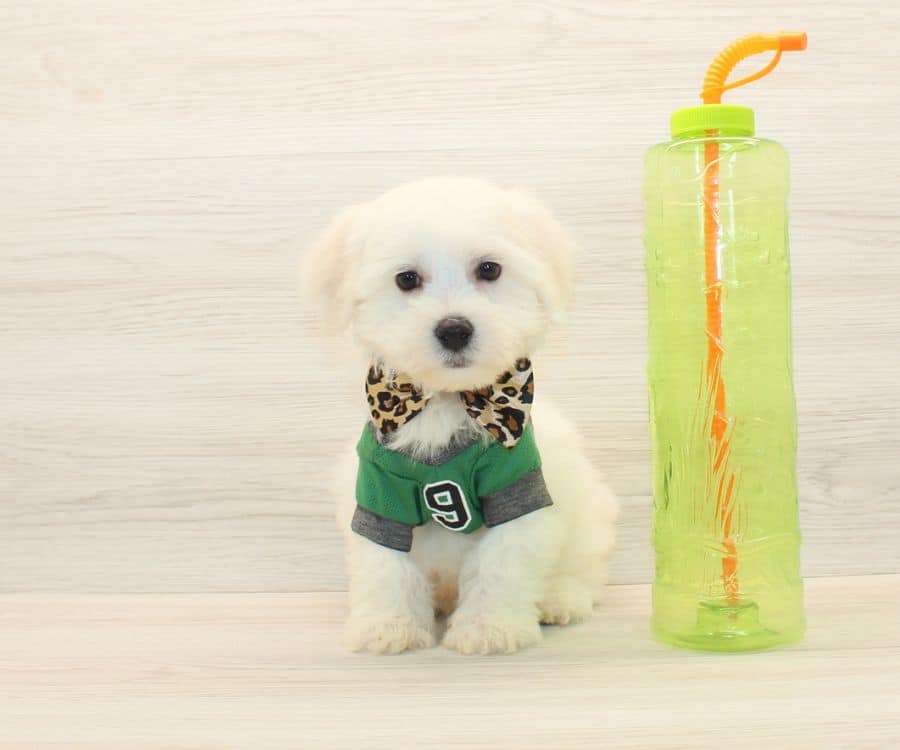- Air shipping is available throughout US & Canada
Home » Purebred Puppies » Bichon Frise
If you’re looking for a hypoallergenic, cuddly, and joyful companion, our Bichon Frise puppies for sale are the perfect fit. Trusted by families, seniors, and celebrities alike, Bichons are known for their charm and loyalty.

A purebred toy breed with Mediterranean roots, the Bichon Frise is known for its soft, curly white coat, playful personality, and allergy-friendly qualities.
Bichons were adored by French royalty, performed in circuses, and loved by sailors. Today, they’re therapy dogs, lap companions, and family favorites.
Bichons are great for first-time owners, families with children, or seniors looking for a loyal, low-maintenance companion.
Yes. Their coat helps trap dander, making them a top pick for allergy-sensitive households.
“We flew our Bichon in from Puppy Heaven—healthy, beautiful, and cuddly from day one.” — Emily T., NY
“I’ve never had such an easy puppy. He’s so smart and gentle!” — Jorge M., Austin, TX
New York, NY – Los Angeles, CA – Chicago, IL – Dallas, TX – Miami, FL – Seattle, WA – Boston, MA – Las Vegas, NV – Atlanta, GA – Phoenix, AZ …
Bichons can jump up to 24 inches—keep gates high and watch for sneaky escapes!
Needs approx. 1 oz of water per pound of body weight daily. Use filtered water bowls or automatic fountains to encourage drinking.
Best kept between 65–75°F. Avoid extreme heat. In cold weather, use sweaters or boots for short outdoor walks.
Old French lore claims that Bichons were “the entertainers of kings,” known to be pampered and painted during festivals of Versailles.
JR (“Special Times Just Right”) won Best in Show at Westminster in 2001. He remains the breed’s most iconic show dog.
Estimated 70,000 to 100,000 Bichon Frise puppies are born annually across the world, based on club and breeder statistics.
Bichons are known to reduce anxiety and loneliness. They’re popular therapy and emotional support animals thanks to their gentle, loving nature.
One Bichon in Chicago barked for 20 minutes straight during a carbon monoxide leak—alerting his family and saving their lives. He was named “Hero Dog of the Month.”
Whether you’re a first-time dog parent or adding to your fur family, Bichon Frise puppies for sale from Puppy Heaven deliver charm, joy, and unmatched companionship. Our clean nursery, loving team, and expert care make us a trusted choice nationwide.

Introducing Duke– a delightful Bichon Frise with a cheerful disposition and an affectionate nature. Her charming personality and playful spirit make her the perfect companion for families, singles, and seniors alike. Duke's gentle demeanor ensures she's always ready for cuddles and companionship.
Bichon Frises have been cherished companions for centuries, known for their friendly nature and adaptability. Duke embodies all the qualities that make this breed so beloved.
We offer easy financing with 100% approval rates, ensuring that Duke can become a part of your family without financial strain.
Can't wait to see Duke? Schedule a live video chat and experience her delightful personality firsthand. It's the next best thing to holding her in your arms!
With her irresistible charm and petite stature, Duke is capturing hearts rapidly. Don't miss the chance to welcome this little sweetheart into your life. Contact us now to reserve her before she's gone!
With over two decades of experience, Puppy Heaven is a trusted name in providing healthy, happy puppies to loving homes. Our commitment to excellence and our extensive list of satisfied clients, including celebrities, speak volumes about our dedication. When you choose us, you're choosing quality, integrity, and a lifelong support system.